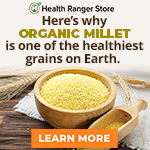
Studies show that chia seeds can treat diabetes, boost energy and more
Sunday, December 15, 2013 by: Michael Ravensthorpe
Tags: chia seeds, diabetes treatment, essential fatty acids
- Newly released JFK files reveal Pentagon's role in creating Lyme disease and covid in the same lab
- Trump nominates VACCINE ZEALOT Susan Monarez to lead the CDC, sidelining RFK Jr.'s reform efforts
- Obama accused of laundering USAID funds to fuel global protest movements, regime change operations
- Trump's greatest betrayal so far: Accelerating Middle East wars, silencing dissent, and serving Zionist masters
- STARDUST, a secretive Israeli-US startup, plans risky solar geoengineering experiment to BLOCK OUT THE SUN
- Trump shows his true colors
- $2B Roundup verdict: A landmark blow to Bayer and a win for health freedom
- Festive flavors: The sweet history, nutritional profile and health benefits of pecan pie
- Outrageous government fraud: $312M in COVID loans went to children as young as 9 months old
- Elon Musk: Aliens could be here on Earth RIGHT NOW
- Dr. Mike Yeadon releases 15-minute testimony - WATCH - about genocidal intent of COVID “vaccines”
- Sugarcane extract superior to cholesterol-lowering drugs?
- HUGE: Putin claims 2020 election fraud in U.S. sparked Ukraine war, calls for peace talks with Trump
- California's social media censorship law struck down: A victory for free speech or a threat to online safety?
- Reclaim your health: How midlife exercise reverses years of inactivity
- Chris Rufo finally reveals abuse liberals unleashed on his wife and young kids...
- Pilots report mysterious lights 'moving at extreme speeds' across Oregon skies
- SWEET SABOTAGE: CIA's secret war on Soviet sugar revealed in JFK files
- Newly released JFK files reveal Pentagon's role in creating Lyme disease and covid in the same lab
- Elon Musk: Aliens could be here on Earth RIGHT NOW
- Reclaim your health: How midlife exercise reverses years of inactivity
- Trump reverses course on Gaza plan, says “nobody is expelling Palestinians”
- EPA advisor admits the agency is funneling billions to climate groups ahead of Trump’s return to White House
- Big Pharma's $8 Billion bribery scheme exposed: how doctors are pushed to prescribe junk science, not heal
- Space war brewing? Russia threatens to destroy Starlink satellites
- A lack of integrity in Academia: Harvard professor found GUILTY of fraudulent research to promote CRT theory
- Survival 101: Effective EMF blocking techniques
- Rep. Nancy Mace introduces bill to ban biological males from female facilities on federal property
- Mike Adams Sermon 66: God will DESTROY ISRAEL for its wickedness
- Pilots report mysterious lights 'moving at extreme speeds' across Oregon skies
- 5 Simple steps to boost your brainpower: How to strengthen executive function in a distracted world
- Historian warns Israel may be entering an “IRREMEDIABLE DECLINE”
- Florida takes a stand: DeSantis proposes permanent ban on mRNA vaccine mandates
- RFK Jr.'s SSRI antidepressant investigation sparks liberal meltdown, exposes Big Pharma's dangerous game
- OpenAI whistleblower who dissented against how the company trained ChatGPT found dead
- Sugarcane extract superior to cholesterol-lowering drugs?
- EPA advisor admits the agency is funneling billions to climate groups ahead of Trump’s return to White House
- The Health Ranger releases “Vaccine Zombie” song and music video, using AI-animated zombies for the music video
- California's social media censorship law struck down: A victory for free speech or a threat to online safety?
- Dr. Mike Yeadon releases 15-minute testimony - WATCH - about genocidal intent of COVID “vaccines”
- The pandemic as a tool for INDOCTRINATION: Understanding “The Indoctrinated Brain” by Dr. Michael Nehls
- Mike Adams releases country western hit single: Goin’ Back in Time is Comin’ Home
- Mike Adams releases music poetry sensation: A Child of God
- RFK Jr. clears key hurdle: Sen. Susan Collins backs controversial HHS nominee, signaling a new era for health policy
- Florida takes a stand: DeSantis proposes permanent ban on mRNA vaccine mandates
- Unpacking the Lies That We’ve Been Fed – new song and music video released by Mike Adams, the Health Ranger
- Mike Adams releases new song and music video: Nothing More Disgusting Than a Globalist
- Congratulations to the FULLY UNVACCINATED as you resisted the COVID-19 PROPAGANDA MACHINE fueled by over $100 BILLION
- “Why we influenced the 2020 elections”: Facebook files reveal the coordinated effort to bury the Hunter Biden laptop story
- Michigan sheriff announces criminal investigation into 2020 election crimes, Dominion Voting Systems
- Israeli soldiers accused of even more torture and abuse in the West Bank
- Migrants are taking advantage of recent hurricanes to scam residents and loot their homes
- House Intelligence Committee calls for the ARREST and PROSECUTION of Dr. Anthony Fauci
- Peter Rost exposes Big Pharma corruption in his book “The Whistleblower: Confessions of a Healthcare Hitman”
- Red Cross issues warning to stop blood plasma donations from vaccinated people
- Scientists confirm: GENIUS brain function can be spontaneously unleashed in humans without any apparent cause
- EPA advisor admits the agency is funneling billions to climate groups ahead of Trump’s return to White House
- HYSSOP: What research reveals about the health benefits of this ancient holy herb
- Two containers with completed ballots fall out of truck in Florida
- Fully vaccinated about to see “tsunami” of illness and death, warns virologist
- Global leaders unite to clamp down on “misinformation” with UN-backed Cascais Declaration
- BREAKING: 2025 NDAA authorizes mandatory military draft of WOMEN across America… as Pentagon pursues global NUCLEAR war with both Russia and China at the same time
- Michael Yon warns of a ZIONIST TAKEOVER in Trump’s second administration
- BOMBSHELL: DNA testing kits are a SCAM to develop ethnic-specific bioweapons
- Ozempic and Wegovy weight loss drugs are injectable LIZARD VENOM PEPTIDES that may unleash a devastating wave of organ failure… side effects align with symptoms of SNAKE BITES
- Israeli soldiers accused of even more torture and abuse in the West Bank
- These 13 countries just signed an agreement to engineer a global FAMINE by destroying food supply
- NASA admits that climate change occurs because of changes in Earth’s solar orbit, and NOT because of SUVs and fossil fuels
- RFK Jr. clears key hurdle: Sen. Susan Collins backs controversial HHS nominee, signaling a new era for health policy
- Sermon 30: How Jesus reveals Caesar’s FAKE CURRENCY and FALSE AUTHORITY
- Coriander seeds: Ancient medicine backed by modern science
- Arizona officials claim Maricopa County needs 10-13 days to tabulate results of the election
Aztec warriors treasured chia seeds for their medicinal properties, and many of these alleged properties are now being confirmed by contemporary studies. Below is a list of the health benefits attributed to chia seeds and the research that reinforces them.
Rich in essential fatty acids
One serving (2 ounces) of chia seeds contains approximately 11 grams of fat. Of these, 1 gram is saturated fat, while the remainder is comprised of essential polyunsaturated and monounsaturated fats, including omega-3 and omega-6 fatty acids. In fact, according to a 2005 study published in the Nutrition Research journal, chia seeds are the greatest plant-based sources of alpha-linolenic acid (ALA). ALA is an essential omega-3 fatty acid that has been known to prevent cancer, lower the risk of cardiovascular diseases, reduce cortisol levels and much more. Moreover, chia seeds and other foods that contain optimum omega-3/omega-6 balances are known to improve brain function, since our brains are built from the same fats.Excellent source of protein and energy
According to chia expert Dr. Wayne Coates, chia seeds are comprised of at least 20 percent protein. This protein is high-quality; the amino acid score for chia seeds is 91 out of a possible 100, which dwarfs the scores of other protein-packed seeds such as flax seed. This near-perfect amino acid profile makes chia seeds an excellent 'complete' protein source for vegetarians, as well as a potent energy source for bodybuilders and athletes. In fact, according to The Magic of Chia author James Scheer, chia was once called the "Indian Running Food" due to its significant energy-boosting properties.Help treat diabetes
Several studies have confirmed the long-held belief that chia seeds can help treat diabetes. One January 2009 study published in the British Journal of Nutrition, for instance, found that chia could normalize insulin resistance in diabetic rats while reducing the fat and cholesterol in their blood. These findings reinforce the results of an earlier 2007 study for the Diabetes Care journal, which concluded that chia improved "major and emerging cardiovascular risk factors in type 2 diabetes" in 20 patients.These impressive results are often attributed to the fact that chia seeds form a gel when ingested, which slows the breakdown of carbohydrates, allowing the digestive system to process sugar in a more gradual and stable manner.
Packed with nutrients and minerals
According to the information supplied by NutritionData, 1 ounce (28 grams) of dried chia seeds contains 18 percent of our RDI of calcium, 27 percent of our RDI of phosphorus, 30 percent of our RDI of magnesium and varying quantities of zinc, copper and potassium. 1 ounce of chia seeds also contains a whopping 42 percent of our RDI of dietary fiber, making them an effective natural cure for constipation.Chia seeds are easy to find online and in health food stores, and they boast a long shelf life. Though they are usually eaten "as is," often as a snack in-between meals, some people like to add them to their morning smoothies or breakfast cereals.
Sources for this article include:
http://newcrops.org
http://www.ncbi.nlm.nih.gov
http://www.ncbi.nlm.nih.gov
http://www.ncbi.nlm.nih.gov
http://nutritiondata.self.com
http://science.naturalnews.com
About the author:
Michael Ravensthorpe is an independent writer whose research interests include nutrition, alternative medicine, and bushcraft. He is the creator of the website, Spiritfoods, through which he promotes the world's healthiest foods.
Chia seeds at FETCH.news
Get independent news alerts on natural cures, food lab tests, cannabis medicine, science, robotics, drones, privacy and more.
Take Action: Support Natural News by linking to this article from your website
Permalink to this article:
Embed article link: (copy HTML code below):
Reprinting this article:
Non-commercial use OK, cite NaturalNews.com with clickable link.
Follow Natural News on Facebook, Twitter, Google Plus, and Pinterest
Science News & Studies
Medicine News and Information
Food News & Studies
Health News & Studies
Herbs News & Information
Pollution News & Studies
Cancer News & Studies
Climate News & Studies
Survival News & Information
Gear News & Information
News covering technology, stocks, hackers, and more



"Big Tech and mainstream media are constantly trying to silence the independent voices that dare to bring you the truth about toxic food ingredients, dangerous medications and the failed, fraudulent science of the profit-driven medical establishment.
Email is one of the best ways to make sure you stay informed, without the censorship of the tech giants (Google, Apple, Facebook, Twitter, YouTube, etc.). Stay informed and you'll even likely learn information that may help save your own life."
–The Health Ranger, Mike Adams












































